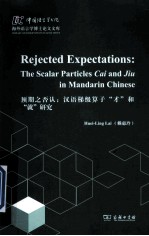

预期之否认 汉语梯级算子“才”和“就”研究 the scalar particles Cai and Jiu in mandarin ChinesePDF电子书下载
- 电子书积分:9 积分如何计算积分?
- 作 者:赖惠玲著;潘海华,张蕾导读
- 出 版 社:北京:商务印书馆
- 出版年份:2014
- ISBN:9787100102933
- 页数:158 页
Chapter One:General Introduction 1
1.1 Facts 1
1.2 An Overview 4
1.3 Organization of the Dissertation 5
Chapter Two:Previous Analyses of the Two Particles 6
2.1 Earlier Approaches 6
2.2 Paris's Analysis of Cai and Jiu 8
2.3 Biq's Analysis of Caiand Jiu 17
2.4 Summary 28
Chapter Three:Theories of Corresponding Particles in Other Languages 30
3.1 L?bner's(1989)"Duality Hypothesis" 30
3.2 Van der Auwera's(1993)"Double Alternative Hypothesis" 33
3.3 Garrido's(1992)"Expectation Theory" 37
3.4 Michaelis's(1993)Analysis of the Polysemy of Adverbial Still 38
3.5 Summary 40
Chapter Four:An Analysis of Cai and Jiu 42
4.1 The Temporal Use of Cai and Jiu 42
4.2 The Restrictive Use of Cai and Jiu 88
4.3 The Conditionals vs.Cai and Jiu 112
4.4 The Emphatic Use of Cai and Jiu 134
4.5 Summary 145
Chapter Five:Concluding Remarks 148
5.1 Summary of the Analysis 148
5.2 Further Issues 151
References 153
VITA 158
- 《钢渣梯级利用技术》徐国平,黄毅,程慧高,万迎峰,林路 2016
- 《二十四史导读 第1册 (附《清史稿》导读)》孟繁华,许嘉利主编 2013
- 《童书100讲 经典导读》刘莘,刘焕阁主编 2020
- 《中国现代文学作品经典导读 1917-2017》方爱武,左怀建主编 2019
- 《1844年经济学哲学手稿导读》周嘉昕编著 2019
- 《英语文学原著导读》陈敬玺编著 2019
- 《世界学术经典系列 历史的观念 导读注释版》(英国)科林伍德,张旭,肖志兵 2019
- 《仲夏夜之梦 英文导读版》(英)莎士比亚著 2017
- 《否认》(美)黛博拉·利普斯塔特著 2018
- 《雷锋日记 名师导读》(中国)雷锋 2019
- 《海明威书信集:1917-1961 下》(美)海明威(Ernest Hemingway)著;潘小松译 2019
- 《彼得·布鲁克导演实践研究》邓小玲著 2019
- 《旅伴文库 白衣女人》潘华凌译;(英)威尔基·柯林斯 2019
- 《南方快车》朱卫净,潘丽萍责编;吴娴敏译者;(智利)路易斯·塞普尔维达 2019
- 《流体力学与传热学》潘小勇编著 2019
- 《自然地理基础》张蕾蕾编著 2018
- 《并行数据挖掘及性能优化》荀亚玲著 2020
- 《虚拟现实与人工智能技术的综合应用》潘晓霞著 2018
- 《海明威书信集:1917-1961 上》(美)海明威(Ernest Hemingway)著;潘小松译 2019
- 《文学翻译与大学英语教学》余玲著 2019
- 《指向核心素养 北京十一学校名师教学设计 英语 七年级 上 配人教版》周志英总主编 2019
- 《北京生态环境保护》《北京环境保护丛书》编委会编著 2018
- 《商务英语口译教程 第3版》朱佩芬,徐东风编著 2017
- 《指向核心素养 北京十一学校名师教学设计 英语 九年级 上 配人教版》周志英总主编 2019
- 《实用商务英语听说 第1册》窦琳,江怡平主编 2019
- 《英语实训教程 第2册 商务英语听说》盛湘君总主编 2019
- 《高等院校旅游专业系列教材 旅游企业岗位培训系列教材 新编北京导游英语》杨昆,鄢莉,谭明华 2019
- 《近代民营出版机构的英语函授教育 以“商务、中华、开明”函授学校为个案 1915年-1946年版》丁伟 2017
- 《手工皮艺 时尚商务皮革制品制作详解》王雅倩责任编辑;陈涤译;(日)高桥创新出版工坊 2019
- 《指向核心素养 北京十一学校名师教学设计 数学 九年级 上 配人教版》周志英总主编 2019
